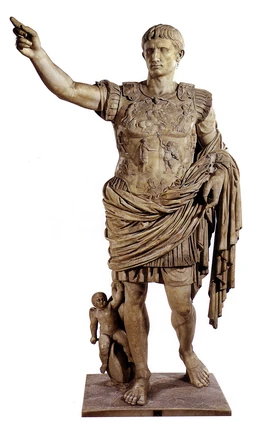
Roman Augustus
Imperator is when a victorious commander could be hailed as imperator in the field by his troops. The Senate could then award or withhold the extraordinary honor of a triumph; the triumphal commander retained the title until the end of his magistry Roman tradition held the first triumph as that of Romulus but the first attested recipient of the title imperator in a triumphal context is Aemilius Paulus in 189 BC. It was a title held with great pride: Pompey was hailed imperator more than once, as was Sulla, but it was Julius Caesar who first used it permanently - according to Dio, this was a singular and excessive form of flattery granted by the Senate, passed to Caesar's adopted heir along with his name and virtually synonymous with it
In 38 BC Agrippa refused a triumph for his victories under Octavian's command and this precedent established the rule that the princeps should assume both the salutation and title of imperator. It seems that from then on Octavian (later first emperor Augustus) used imperator as a praenomen (Imperator Caesar not Caesar imperator). From this the title came to denote the supreme power and was commonly used in that sense. Otho was the first to imitate Augustus but only with Vespasian did imperator (emperor) become the official title by which the ruler of the Roman Empire was known.
Imperatores in the Roman Republic[]
In Roman Republican literature and epigraphy, an imperator was a magistrate with imperium. But also, mainly in the later Roman Republic and during the late Republican civil wars, imperator was the honorific title assumed by certain military commanders. After an especially great victory, an army's troops in the field would proclaim their commander

imperator, an acclamation necessary for a general to apply to the Senate for a triumph. After being acclaimed imperator, the victorious general had a right to use the title after his name until the time of his triumph, where he would relinquish the title as well as his imperium.
Since a triumph was the goal of many politically ambitious Roman commanders, Roman Republican history is full of cases where legions were bribed to call their commander imperator. The title of imperator was given in 90 BC to Lucius Julius Caesar, in 84 BC to Gnaeus Pompeius Magnus, in 60 BC to Gaius Julius Caesar, relative of the previously mentioned Lucius Julius Caesar, in 45 BC again to Gaius Julius Caesar, in 44 BC to Marcus Iunius Brutus, and in 41 BC to Lucius Antonius (younger brother and ally of the more famous Marcus Antonius). In 15 AD Germanicus was also imperator during the empire (see below) of his adoptive father Tiberius.